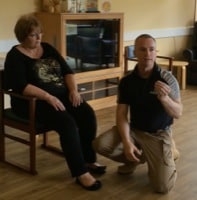Time and again caregiving staff in services for older people are explaining scenarios where they believe:
1) The resident’s care needs and previously reported challenging behaviour / violent incidents were not assessed properly prior to admission to the home.
2) The instructions from supervisors were not appropriate to the person’s needs.
3) Newly identified risks arising from developing behaviour patterns are reported but not acted upon.
4) the concerns of staff are not being taken seriously (for example with that resident who spits at staff: often no risk-control measures have been put in place for the risk of infection)
5) Agency staff are not taking the time, or are not given the time, to become familiar with the residents they are working with and that this actually causes issues with aggression and violence at a later time.
6) Staff often feel that some residents’ needs are far more complex than their training or experience is sufficient to deal with. (examples: severe learning disability, sexual disinhibition or significant dementia).
ISSUES:
Staff have reported to our training teams, across the many care homes we work with, that they understand or feel or interpret the words and actions of managers to be at odds with the principles of person-centred-care or of staff safety.
As soon as risks to the health & safety of staff are identified, it is incumbent on management of a care home to respond in good time and in a suitable and sufficient way to reduce those risks as far as is reasonably practicable. The risks of physical injury from assault are serious risks and therefore necessitate a risk vs cost analysis when management consider the appropriate steps required to control them.
If the incidence of violence and aggression is frequent and of a sufficient risk level that staff are being bruised or they are experiencing muscle strains and joint pain (such as in several of the incidents as they are related to our training team) then they warrant serious consideration by management under the following legislation:
- Health & Safety at Work Act 1974 (Section 2, Section 7)
- Management of Health & Safety at Work Regulations (Section 3, Section 8)
- Health & Safety Offences Act 2008
- Corporate Homicide Act 2007
- Human Rights Act 1998 (Article 2 the Right to Life)
It is important to note that a lack of resources does not mitigate the responsibilities of management under these statutory duties. Managers and supervisors at the care homes should be made fully aware of their obligations under health & safety law, guidance and regulations so that the ‘near misses’ and management of residents’ distressed or challenging behaviours do not result in criminal or civil cases involving negligent liability.
Gerard O’Dea is a conflict management, personal safety and physical interventions training consultant. He is the training director for Dynamis, a specialist provider of personal safety and violence management programmes and the European Adviser for ‘Verbal Defense and Influence’, a global programme which addresses the spectrum of human conflict. www.dynamis.training



